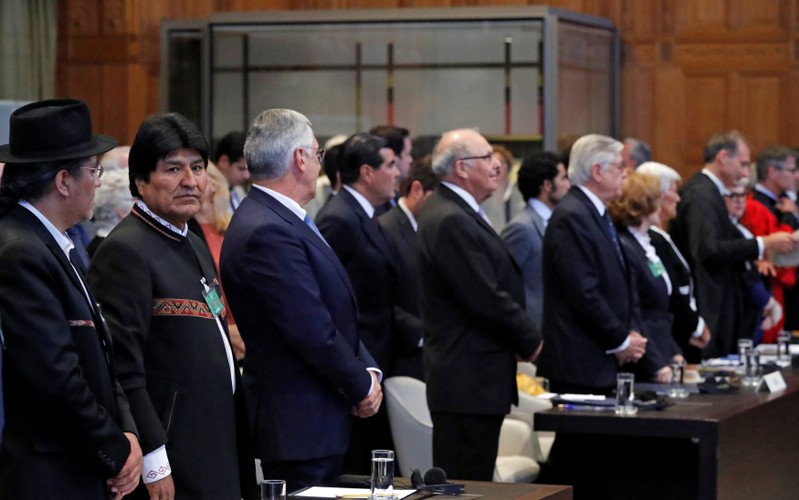
Bolivian President Evo Morales is seen at the International Court of Justice, the U.N.’s highest court for disputes between states, before the ruling on a dispute between Bolivia and neighbour Chile on access to the Pacific Ocean, in The Hague, the Netherlands October 1, 2018. REUTERS/Yves Herman
October 1, 2018
By Stephanie van den Berg
THE HAGUE (Reuters) – Landlocked Bolivia cannot force Chile to negotiate over granting it “sovereign access” to the Pacific Ocean, judges at the International Court of Justice ruled on Monday in a setback to Bolivian President Evo Morales.
Bolivia surrendered most of its former coastline to Chile in a 1904 treaty following the War of the Pacific. The Andean neighbors have held occasional talks about a possible corridor to the sea for Bolivia ever since but judges said that did not create any obligation for Chile to actually negotiate one.
Morales attended the court session and was expected to address reporters outside the Peace Palace in The Hague, where the court is based.
Reading the panel’s 12-3 decision, Presiding Judge Abdulqawi Yusuf said that despite the countries’ long history of talks, Chile had never bound itself to negotiations that would lead to a surrender of territory, as Bolivia had argued.
Accordingly “the court is unable to conclude … that Chile has the obligation to negotiate with Bolivia in order to reach an agreement granting Bolivia full sovereign access to the Pacific Ocean.”
Morales listened attentively during the ruling, taking notes as judges rejected all eight grounds advanced by Bolivian lawyers to support their claim.
Chile currently allows Bolivia duty-free access to the port of Arica, near its northern border with Peru. Bolivia aspires to have a corridor including train line and port under its own control, and Morales in 2012 halted discussions he saw as fruitless in favor of seeking a legal ruling to bolster the strength of Bolivia’s case.
Judges noted their ruling, while siding with Chile, was not intended to stop the countries from re-entering negotiations “in the spirit of good neighborliness.”
Yusuf encouraged them to resolve “issues arising from the ‘land-lockedness’ of Bolivia, the solution of which, they have both recognized to be a matter of mutual interest.”
The International Court of Justice, also known as the World Court, is the United Nations’ venue for resolving disputes between nations.
(Reporting by Stephanie van den Berg; Writing by Toby Sterling; Editing by Bill Trott)

